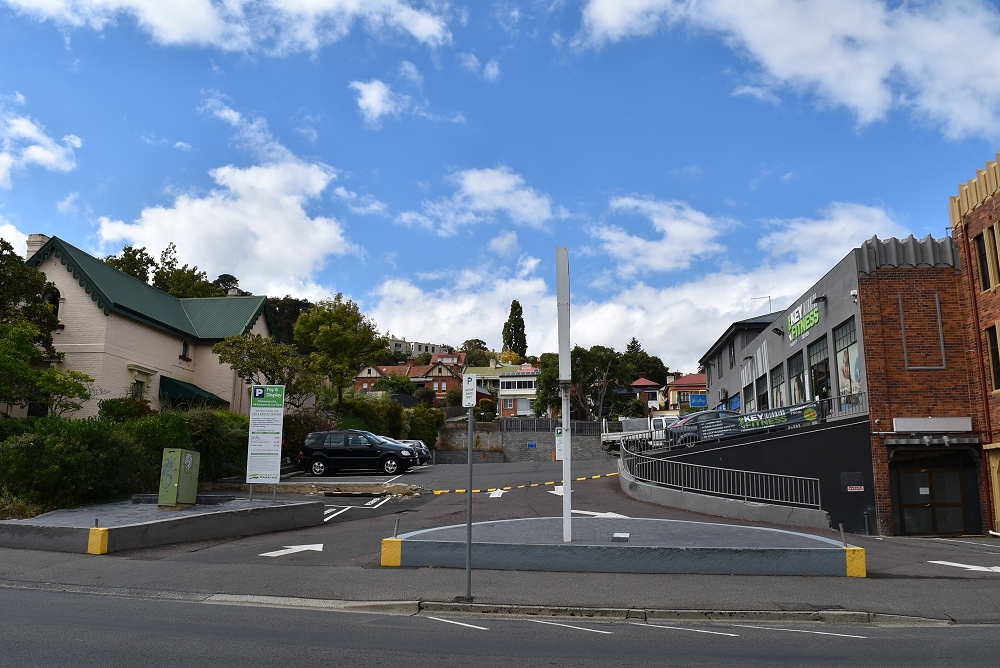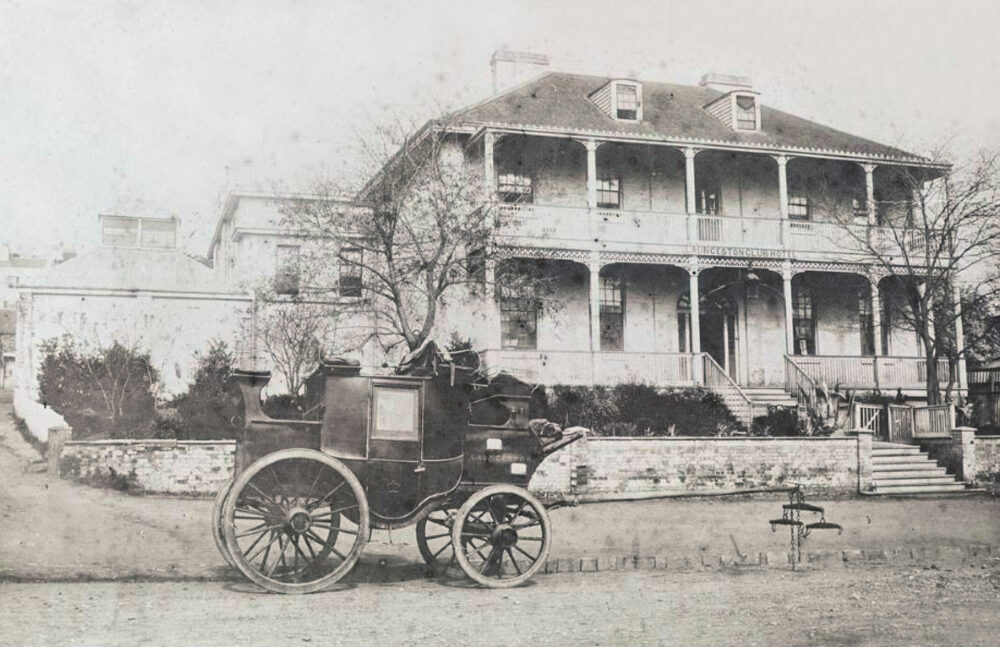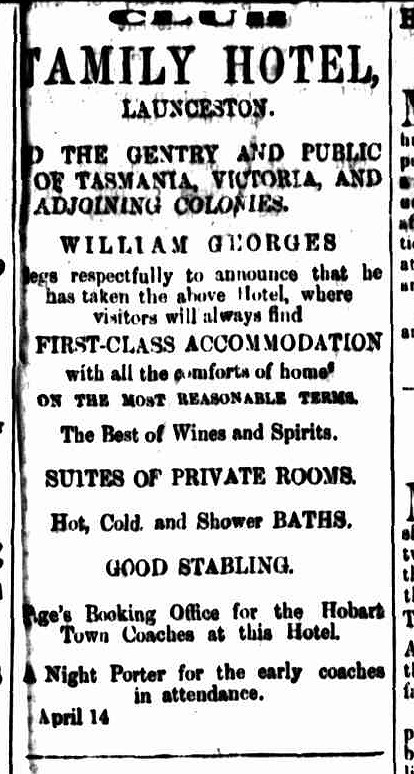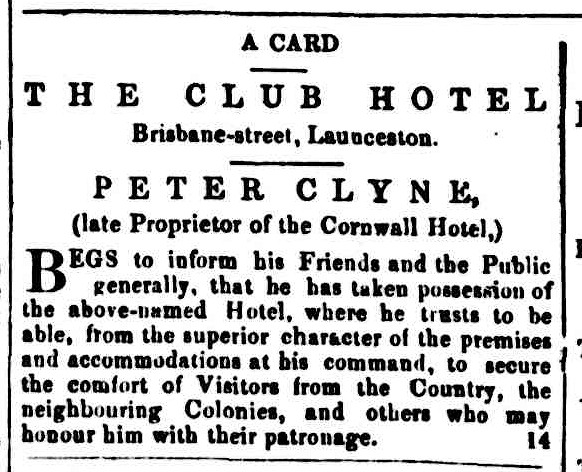43 Brisbane St. Google Maps.



Cornwall Chronicle, 2 January 1867
On the same side of Brisbane-street, we have next to notice the “Club Hotel,” an establishment which in the extent of its accommodation is superior to any hotel in the town. To say that sixty beds could be made up at the Club would not convey a true idea of its resources in the way of rooms, for it is in many respects peculiarly fitted for the reception of families and individuals from the other colonies intending to make a prolonged stay in the town. Besides the public rooms, there are several suites of private apartments, conveniently arranged and handsomely furnished, together with dining hall, billiard room, &c. The proprietor has just laid out in re-decorations and furniture a very large sum indeed, the extent of the alterations are more considerable than we had heard they were to be. Altogether, this hotel from its locality–quiet without being remote from business places–ought to command attention as an admirable temporary residence for visitors whether in pursuit of health, pleasure, or business. The hotel is under the management of Mr. Charles Phillipe Fassert, who has had great experience as hotel proprietor and restaurateur on the continent of Europe and in the United States; and he is determined to spare no pains to make his establishment popular. The culinary department, which is to be a prominent one in this hotel, is under Mr. Fassert’s own superintendence and his testimonials afford a guarantee that everything will be well done in this respect. There is excellent stabling and carriage accommodation at this establishment and if as is reported a second line of coaches to Hobart Town should be started, “the Club will probably be the starting-place.
Examiner, 25 February 1869
BILLIARD LICENSES.–At the Police Court yesterday, the magistrates granted a billiard license to George Talmage for the Club Hotel, Brisbane-street; and a bagatelle license to William Doodie for the Salmon and Ball Hotel, William-street.
Examiner, 23 March 1881
OLD CLUB HOTEL
The Last of a Landmark
Unkind to Lessees
With the sale of the old Australia Hotel property in Brisbane-street, and its probable demolition at an early date, it is interesting to recall some of the building’s history, which is so closely associated with the story of Launceston’s early days. For years the structure has stood as more or less an eyesore in the centre of the city, time and neglect having taken toll of its appearance and utility. Of recent years it has been used spasmodically, some of its flats having been occupied, but it never enjoyed any extensive or payable patronage of late, and presumably to spend sufficient money to bring it up to the standard required in modern residences did not appeal as a business -proposition.
It was erected in the fifties of last century as a club house for the officers of the 99th Regiment, and sometime within the next ten years it was converted into an hotel, and named the Club. Its first rush of popularity came about 1862, when Mrs. Lukin, who at the time had the Cornwall Hotel, left there for the Club, and with her went the stage coach terminal. Page’s coaches had made the Cornwall their headquarters, with a consequent improvement in business from the travelling public, but with the removal to the Club the Cornwall received a substantial setback, and the Club gained thereby. Another thing that helped to popularise the Club was the provision of rooms for social gatherings, accommodation of the kind required for entertaining outside homes being in those days very scarce.
During the visit of the Duke of Edinburgh he was accommodated there, and Mrs. Morrison, who had the Launceston Hotel, had charge of the arrangements while the Royal visitor was there. Later the building was vacant for some years.
The next licensee was Mr. George Talmadge, providore in the old T.S.N. Company. He spent a lot of money on it, converting it into a modern, well furnished hotel, but he failed, and a number of landlords who followed him also met with little success. One of the last people to have it as an hotel was Mr. Michael Hannah, who died in Launceston a few weeks ago. During its period as a hotel the Club had a number of suites that were rented by the year by well known people of the island, among them being Sir Richard Dry.
As an hotel the Club did not treat its licensees too kindly, many of them losing money in it. A happier experience, however, was that of Mr. William Lockwood, who, after it ceased to be an hotel, reopened it as a boarding house. He enjoyed a good measure of patronage, and is reputed to have made money in it. At the time it was very largely patronised by visiting theatrical companies, with which the proprietor was very popular. After he vacated it, however, the decline appears to have commenced. Generally, the history of the old landmark has been picturesque in many respects. Most of its lessees found their venture unfortunate, however, and by now it has long outlived its usefulness, so that its removal will not be regretted.
Examiner, 26 June 1930
